iJapanese
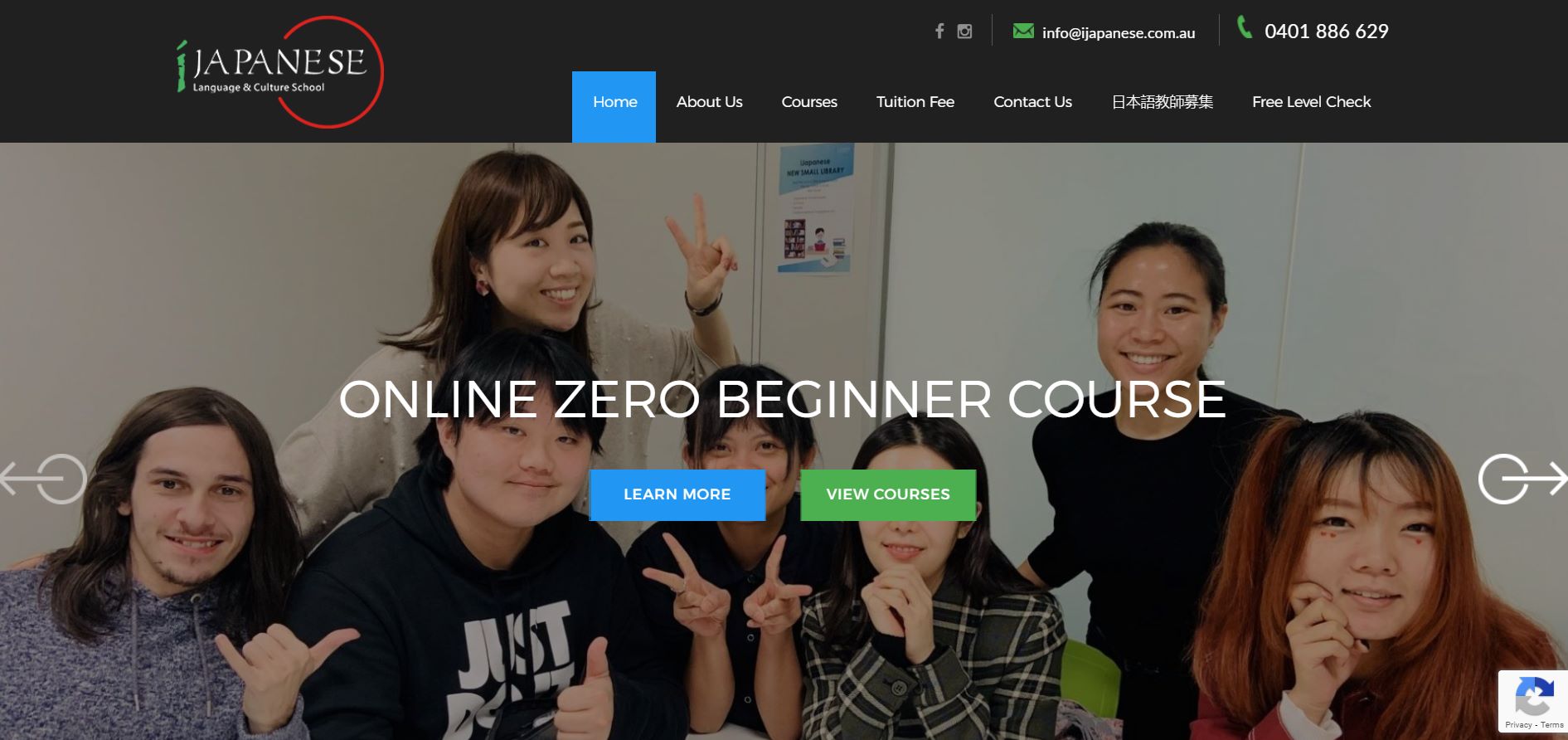
0401 886 620
Study Japanese in Melbourne with iJapanese
The word for "I" has the same pronunciation as the word for "love" in Japanese. Our Japanese tutors at iJapanese Language & Culture School promote a love for this ancient culture through their teachings, ensuring you'll leave our classes with a passion for the country we adore. We take pride in being the best Japanese language school in Melbourne for students seeking a well-rounded experience. You will not only learn to speak Japanese with us, but you will also learn about the country's culture, history, and way of life. And because we have classes for people of all ages, backgrounds, and abilities, you can be confident that we will accommodate you. It's not as difficult as you think!
You will be taught by trained and skilled native Japanese tutors with many years of experience teaching in schools throughout Japan and Australia at iJapanese. Whatever your motivation for learning this language, our goal is to make sure you get the most out of every lesson. Our Japanese school in Melbourne provides language and culture courses in:
Our students can study Japanese in groups or individually, and there is even room to customise your study schedule to fit your schedule and needs. Simply enquire about this when you contact us.
Our friendly Japanese school tutors strive to make each class enjoyable as well as educational, creating a supportive environment in which you can learn to speak Japanese with others who share your goal. Who knows, you might even meet your ideal travel companion!
KonnichiWhat
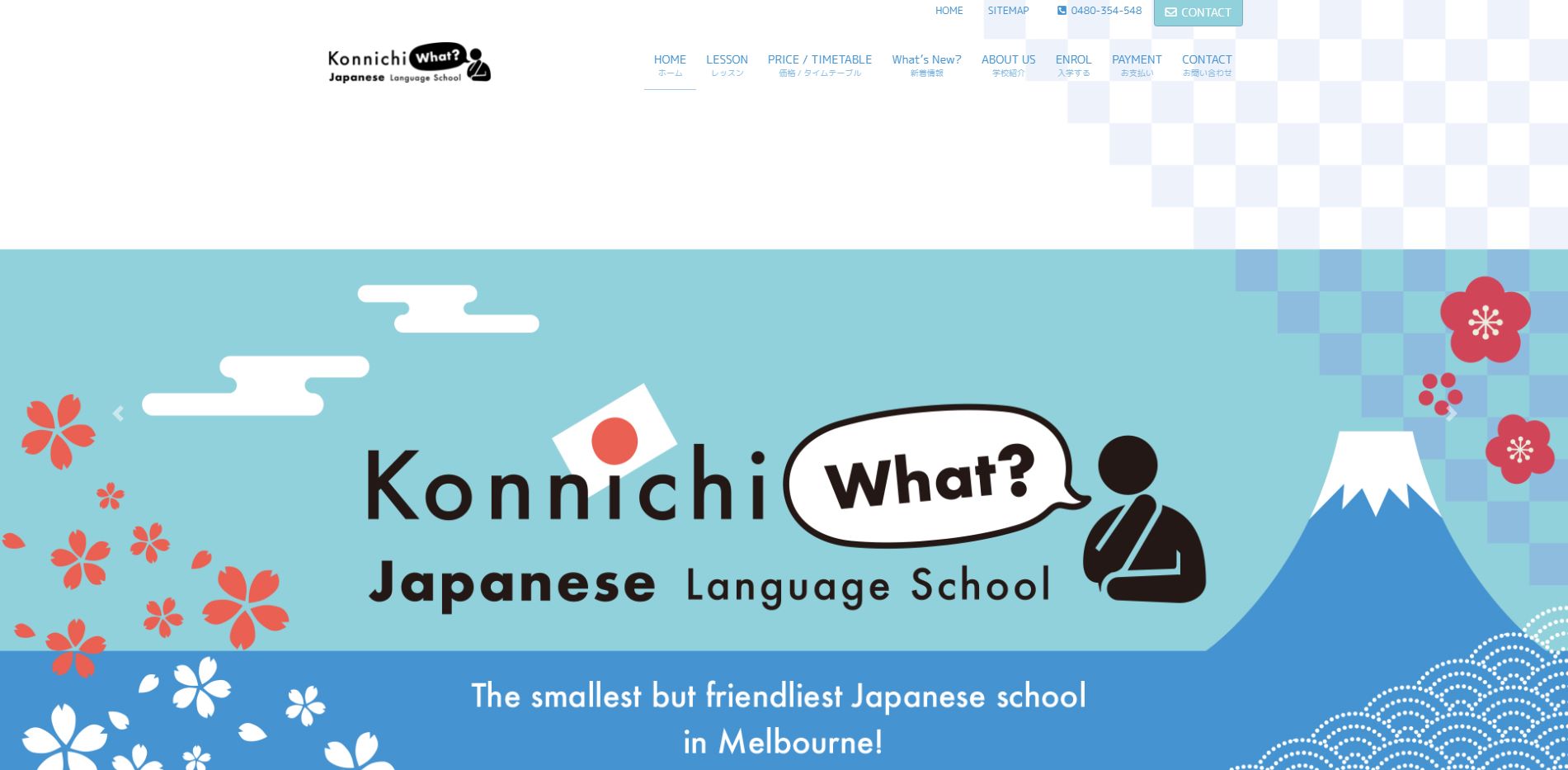
0480-354-549
Konnichiwa! Thank you for visiting KonnichiWhat! Languages have always fascinated and enthralled me. In Tokyo, I earned a degree in Japanese language, literature, and education, as well as a Japanese teaching certificate. Since moving to Australia, I've had incredible opportunities to teach Japanese at a language institute, a local high school, and various businesses. I am also a trainer for the Teaching Japanese as a Second Language course, and I have witnessed the progress and development of several Japanese teachers.
The goal of KonnichiWhat's founding was to support a community of people interested in Japan and learning the Japanese language. Although it can be challenging, learning a language is fun. Our objective is to link individuals with other students who might be motivated by and facing similar challenges. Talking to others about your experiences is always fun!
We understand how difficult it can be to balance language learning with a busy schedule. As a result, all of our private lessons are entirely customizable. You will make rapid progress whether you take intensive lessons, weekly lessons, or a combination of face-to-face and online lessons. You can also choose what you want to learn, such as J-pop lyrics or how to have a conversation about your favourite anime.
If you enjoy interacting with and laughing with other students, this is the course for you! Our general Japanese language courses are immersive, interactive, and taught by highly experienced teachers both in person and online. The atmosphere in the classroom is casual but focused, and the learning activities are designed to keep you engaged and motivated throughout the lesson.
Listen & Learn Australia

listenandlearnaustralia.com.au
(03) 8652 1381
Our Japanese speakers, who are fully qualified to teach their native language, can train you and, if necessary, the rest of your group at a time convenient for you, at your home or workplace. Sessions can take place on any day of the week, including weekends, and at any time of day, whether morning, afternoon, or evening. If your home or office is unavailable due to unforeseen circumstances, classes can be held at your trainer's office. You will be given resources for the lesson.
Listen & Learn is a multinational company that specialises in one-on-one and small group language courses for individuals and businesses. We provide a wide range of language courses to meet the needs of every client.
Our mission is to be one of the leading providers of tailor-made language courses that are tailored to each client's specific needs and requirements.
Our instructors are all fully qualified native speakers who are hired not only for their credentials but also for their experience and passion for teaching. Lessons are designed around you, taking into account your current level and motivation, your personal needs (or those of your business), and any special requirements you may have for learning the language. Lessons are taught in the most effective manner for the student's level.
Avivo Australia
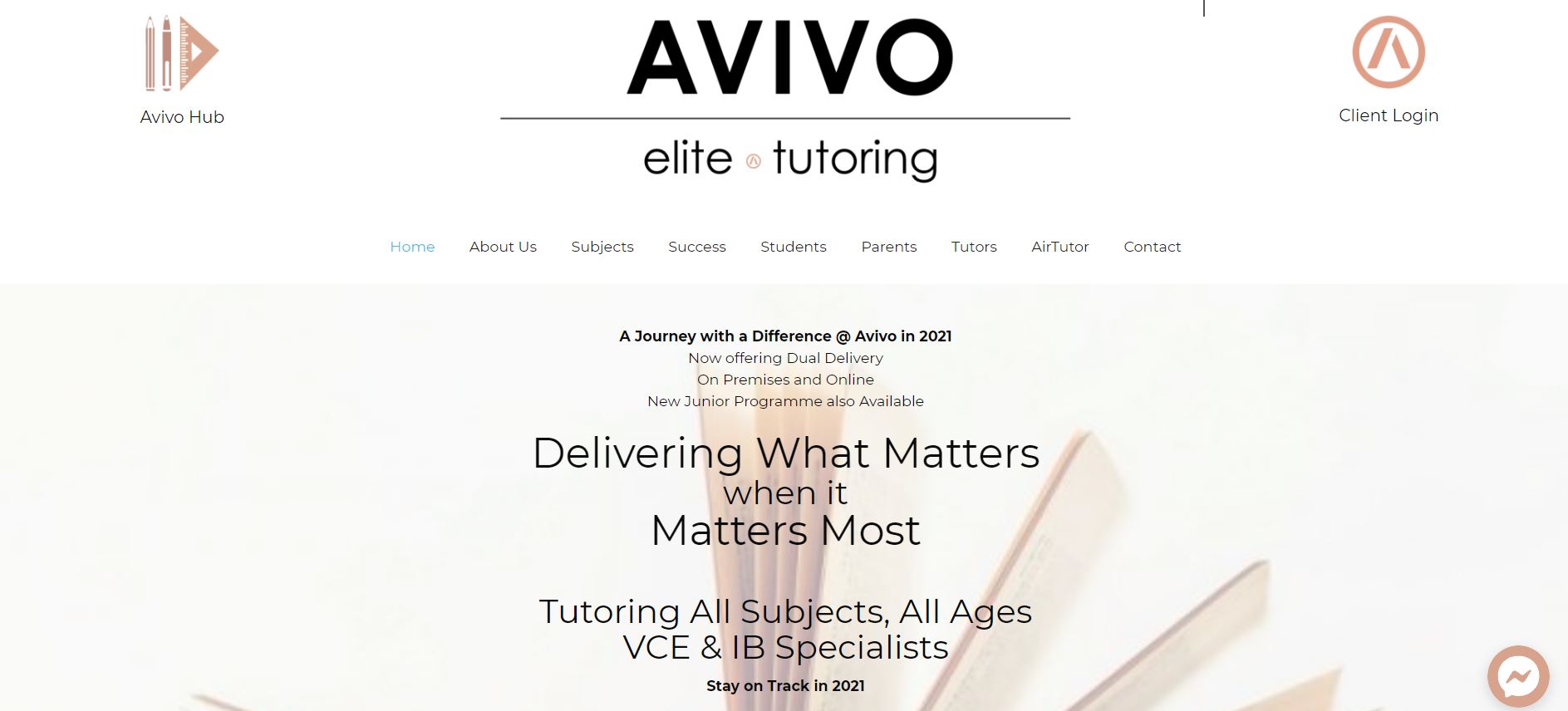
0499 999 819
We collaborate with you to design a personalised learning programme based on how you learn best.
We can help you find the most relatable, engaging, and vibrant tutor for you. Your tutor will help you determine your learning objectives, which could include increasing your confidence in your abilities, improving your grade, or achieving a high study score. Personal achievement is celebrated.
If you have an urgent question, a looming assessment deadline, or an important test tomorrow...... don't worry, we can always help you with one-time tutoring sessions through AirTutor. AirTutor is ideal if you require a tutor at the last minute.
A division of the Australian Institute of Elite Education, Avivo is a tutoring organisation in Australia. The Ronald McDonald Learning Programme, which improves learning for kids with life-threatening illnesses, uses it as a prefered tutoring location.
Japanese Tutor Melbourne
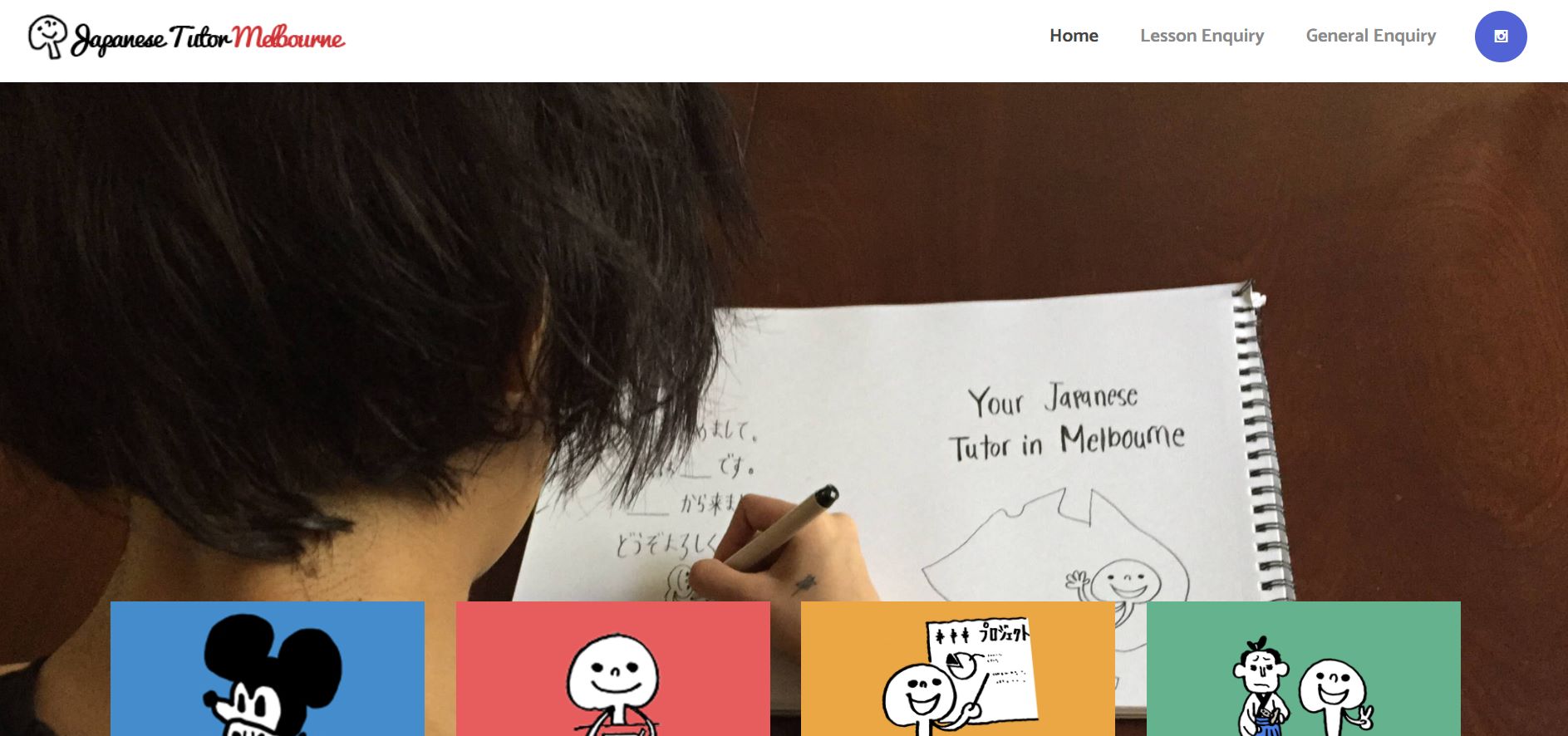
0431 598 573
Your Japanese Tutor in Melbourne
Izumi is one of Melbourne's most experienced Japanese teachers, having taught at all levels in Australia for over ten years. She has taught in primary and secondary schools, as well as tutored groups of university students, during this time. She was even the principal of one of Melbourne's largest Japanese language schools.
Izumi's mission is to provide her students with the best learning experience possible and to make learning Japanese as enjoyable and simple as possible. She accomplishes this by taking the time to get to know each and every student and tailoring lessons to their personality and learning style. Each class is tailored to individual student needs, and one of her favourite aspects is the diversity of her students and their stories.
You will quickly discover, however, that Izumi has her own quirks that make her lessons interesting and memorable beyond the learning experience.
Izumi's special talents include always looking fashionable (even on bad days), making people smile with her cute and unassuming personality, and explaining the most complex Japanese language concepts in a series of cute and playful cartoons/manga.
JAPANEASY
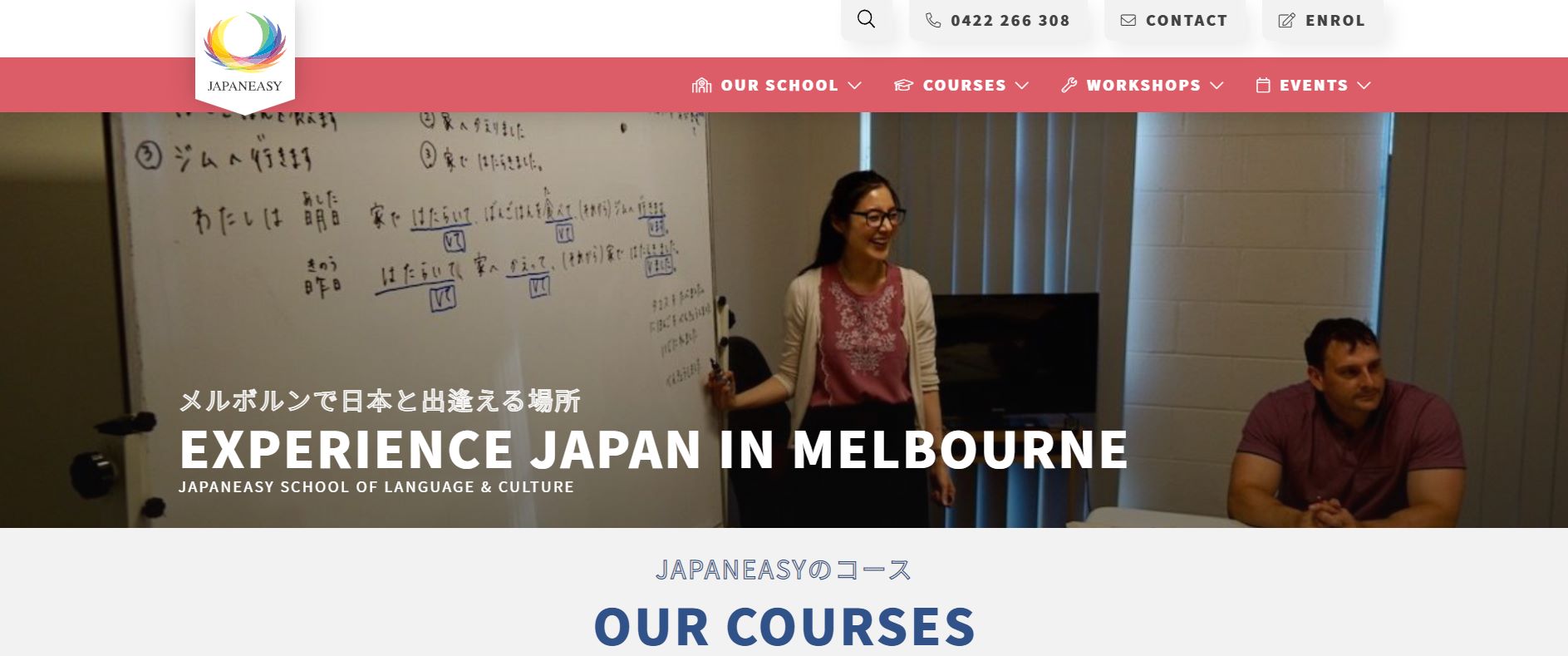
0422 266 303
JAPANEASY was founded in 2008 with a very small room (only 6 square metres!) and approximately 50 students. Since then, we've built a school full of laughter, love, and passion, with the help of many wonderful teachers and countless generous students.
Our goal is to be the happiest school in the world. We are always available to hear all of your voices and assist you in making your dreams a reality.
We believe that both languages and culture are essential for discovering and learning about the country. We hope that our activities will help to improve relations between Japan and Australia, as well as between Japan and yourself.
Japanese Australia
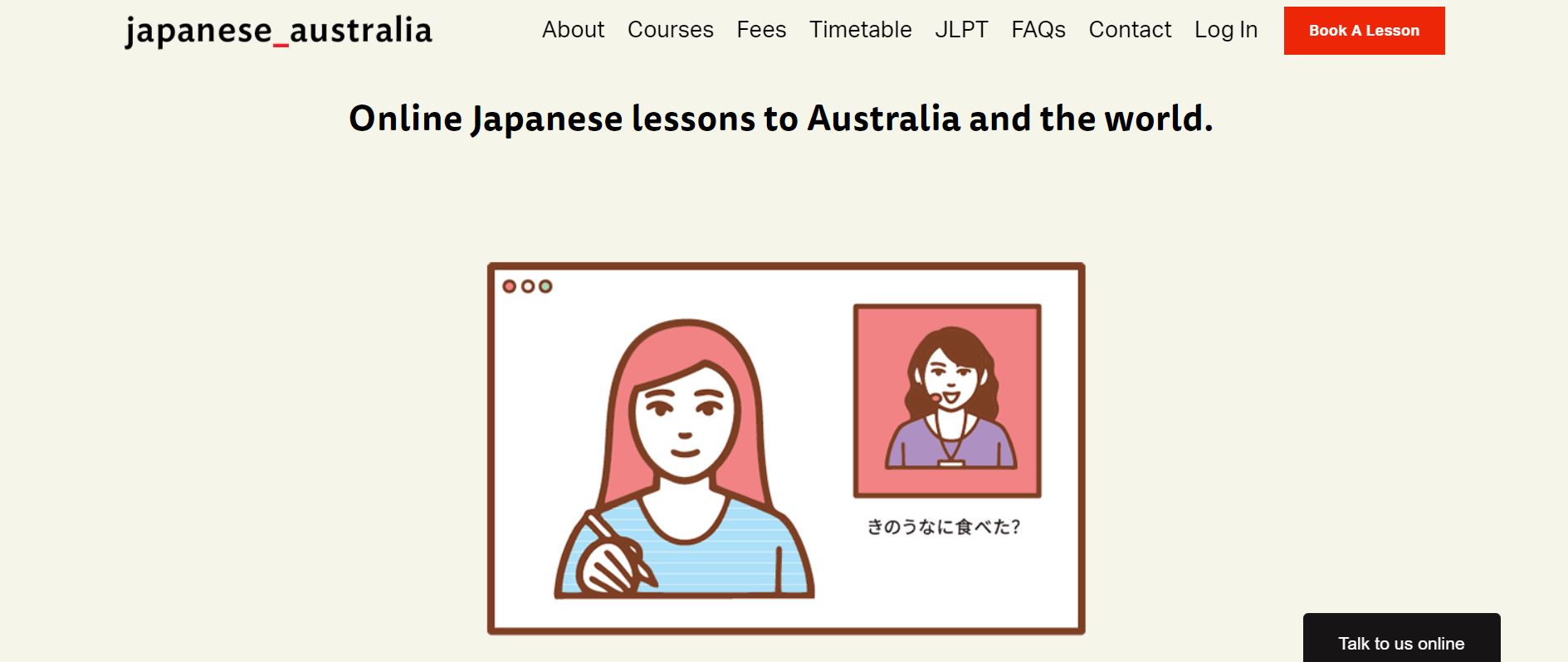
0430103660
After fifteen years, we are now located on the top floor of a structure with eleven classrooms, right in the centre of Melbourne's Central Business District.
We've instructed families and students, as well as Apple geniuses, ATO managers, council members, and even a Channel Nine news anchor. We have extensive experience engaging students from diverse cultural and geographical backgrounds.
Because of COVID-19—I'm not being sarcastic—we moved our Japanese classes online, and much to our surprise, many students seemed to like it.
Especially those who had to travel long distances. The students who despised coming into town, the lack of parking, and the introverts. Some even get to learn alongside friends/families from other countries. Students who prefer to learn in the comfort of their own home while wearing their pyjamas.
Then we realised, if we can teach remotely to outer Melbourne, we can also teach to the rest of Australia.
Vocational Language Learning Centre

03 9602 1606
Since 1989, VLLC has been operating as a language school. We specialise in teaching 12 different languages to individuals and businesses all over Australia.
It is a structured programme based on visualisation and association in which you learn to 'think' rather than translate in your new language. Your course is specifically designed for you. It consists of up to three delivery methods, including online lessons and one-on-one tutorials with native speakers on a regular basis.
The keys to enjoying your language journey and achieving your language goals are flexibility and monitored lessons. You will be speaking from the start. With one of the highest success rates in Australia, 97% of our students have successfully completed their Certificates and enthusiastically recommend VLLC.
Japan has one of the world's largest economies and is your gateway to Asian culture. Take advantage of the opportunity to learn about new cultures, foods, and lifestyles.
Beginner Level Japanese is So Satisfying
To get the most out of your trip, I recommend that you learn the most commonly used greetings and phrases. They keep things running smoothly as a kind of social lubricant.
Beginner level students find learning the basics of Japanese extremely satisfying – and surprisingly simple! It is worth learning some basic, everyday words and phrases, even if you have no intention whatsoever of ever attempting to become fluent in Japanese.
The good news is, there are a few phrases that are absolute music to the ears of literally ALL Japanese people. This is because they have had the importance of greetings instilled in them from being tiny children: you must say certain greetings, and you must say them properly – that is, cheerfully and in a strong voice.
Polite Japanese Greetings Earn RESPECT
Sure, if you say ‘good morning’ in English, people (especially working within the tourist industry) will likely understand. But how much nicer to connect with a heartfelt ‘ohayo gozaimasu’?! It shows respect for the Japanese language, and you will gain respect in turn.
Along with good morning, it is extremely worthwhile to learn about 10 key Japanese phrases, how to pronounce them and when to use them, even if you are going on a short trip.
You’ll Make Connections With the Locals.
Sometimes travellers fear learning the basics in case things escalate. They are afraid they won’t understand something and look silly. However, in learning Japanese basics, you can put that fear to rest.
Firstly, you can learn general, polite greetings which don’t require you to understand an answer. Secondly, Japanese people tend to assume that you won’t speak much Japanese. Finally, they are often (terribly) afraid of speaking English and will thus honestly appreciate your attempts to show willingness and communicate in their language.
Japanese Will Make the Most of Your Trip
But why not deepen your appreciation for Japan’s beautiful and unique culture by gaining insight via the language? Although Japan has become a more accessible tourist destination in recent years, it is still a long-haul flight and a major trip. So make the most of it!
After the travel standstill of 2020, we have realised that what’s important is fully enjoying our everyday lives. Therefore, although frequent flights to Japan will surely return, there will be a knowledge in the future that our preparation for, and anticipation of, a trip to somewhere so far away is such a meaningful part of the experience.
Katakana and Hiragana
The first two are Hiragana and Katakana. Rather than alphabets, they are more correctly called syllabaries. A way to kill two birds with one stone is to memorise each sound with the written component. Get a good hiragana chart and a good katakana chart, practice writing and saying each of the sounds aloud.
The kana (a way to collectively refer to the Hiragana and Katakana together) is rather systematic. If it sounds scary, know that it is rather easy to learn this. Katakana is just a different way of writing Hiragana, and they are fairly similar. The difference is that Katakana is used for more foreign words or emphasises what is written. You should learn this in a couple of weeks to maybe a month. In contrast to these rather easy writing systems, the third one is much more difficult to learn.
Kanji
Kanji is the writing system most similar to that of the Chinese. As such, it would be much easier for a native speaker of some form of Chinese or another language with a similar writing system to learn it than a native English speaker. There are thousands of kanji, and the exact number is unknown. That said, there are 2,136 常用漢字 (jouyou kanji), which are the kanji learned by Japanese students through junior high. An adult should know about a thousand more kanji to be aptly read commonly.
Kanji is usually more complicated than the kana and often has multiple different readings and various meanings. The best way to go about this is to use a website or book dedicated to jouyou or popular kanji and memorise the first couple hundred or so. Write them down and dedicate them to memory. Then, go online with an add on like Rikaichan for firefox, which helps understand Japanese words on web pages. Keep doing this with web pages you find interesting, perhaps writing down every word you don’t know. It may take a while, but this should be expected with how many kanji there are. It may take quite a bit of dedication, in general, to try to learn the kanji, but this should be expected if you want to learn any language. The kanji is a very difficult part of learning Japanese.
A test to grade someone’s Japanese proficiency is the JLPT (日本語能力試験, or Nihongo nouryoku shiken). Kanji is considered by many the most difficult part of learning Japanese. If you are visiting Japan for a short period, you may want to skip the time it would take to learn kanji. But, if you are interested in learning Japanese, you must take the time to learn the kanji. You should not just learn how to speak it, as spoken Japanese is tied very closely with the written language, which takes a mixture of Hiragana, Katakana, and kanji together.
Japanese is a pretty incredible language.
It sounds pretty. It’s a unique language. It has words that don’t even exist in English.
And yet, when some people consider learning Japanese head-on, they quickly get spooked away. It’s no wonder why: Japanese, to the novice or non-speaker, can seem very difficult.
People say that there are too many “alphabets,” that the sentence structure is too different from English, that it’s far too quickly spoken to catch on.
Unfortunately, this perception of Japanese as a difficult language leads some to abandon it before they even start, thinking, “Maybe Japanese just isn’t for me.”
So what’s the truth? Is Japanese that hard to learn?
The short answer: No.
The slightly longer answer: No, but it can have challenging moments.
With consistent studying and speaking, for about 30 minutes to an hour a day, you could speak at a conversational level in Japanese in about 3 months.
It’s all about using the right method, and I’ll say it again: speak from day one! You could start speaking Japanese right now. I encourage you to do so. The more speaking practises you get in, the faster you’ll learn Japanese.
It’s worth noting that some of the reasons why Japanese is hard to learn can apply to many other languages as well. So whether you’re learning German, Chinese or Klingon, every language has its pain points.
Getting past the challenges is part of what makes learning a new language so exciting and satisfying!
Japanese uses four methods of writing.
Japan doesn’t use one “alphabet” for its writing system. Instead, it has four different forms of writing.
Two of the Japanese writing systems are syllabaries. A syllabary is a group of written characters representing syllables in words rather than individual letters. Unlike the Latin alphabet and other languages like German or Russian, Japanese has syllabaries rather than a letter-based alphabet.
It also has a form of writing borrowed from Chinese and an English-sized sounding out words.
If you're interested in learning Japanese, Melbourne is a great place to do it! There are plenty of places where you can get started, and the city's diverse population means there's always someone around who can help. Plus, with Japan being such an important cultural and economic powerhouse, learning the language can give you an edge in your career. So what are you waiting for? Get started today!
To help you get started on your tutor hunt, we've rounded up our favourite places to learn Japanese from right across Melbourne, Victoria.
Ultimate List of Places to Learn Japanese in Melbourne, Victoria
Japanese Tutor Melbourne Pty Ltd
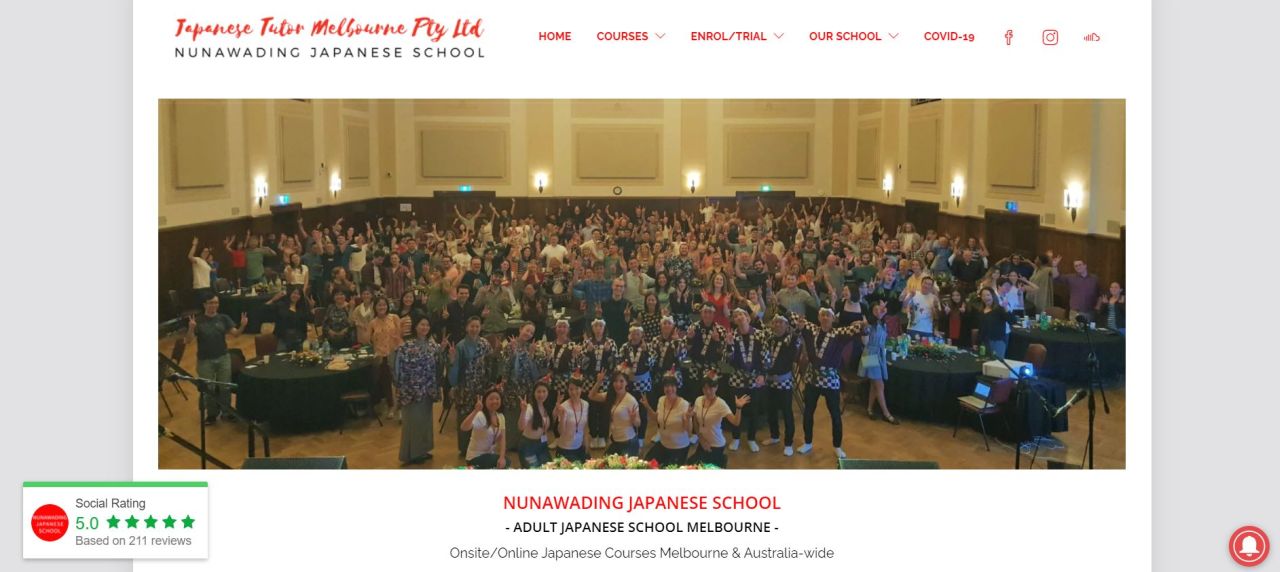
0421 234 950
NUNAWADING JAPANESE SCHOOL
- ADULT JAPANESE SCHOOL MELBOURNE -
Onsite/Online Japanese Courses Melbourne & Australia-wide
We are a Melbourne based Japanese language school for adults (20+ yrs). Our teachers are native Japanese, live in Melbourne and are bilingual. We provide onsite and online Japanese lessons for students in Melbourne and Australia wide.
Our students come from: Nunawading, Blackburn, Mitcham, Ringwood, Bayswater, Croydon, Chadstone, Hughesdale, Wantrina, Knox, Olinda, Forest Hill, Mt Waverley, Glen Waverley, Wheelers Hill, Ashburton, Balwyn, Kew, Camberwell, Burwood, Hawthorn, Box Hill, Donvale, Doncaster, Bulleen, Eltham, Ivanhoe, Warrandyte, Rosanna, Lower Plenty and the list goes on...Even Sydney, Perth, Tasmania and Adelaide!
GROUP CLASSES (Online/Onsite)
Fun, small, interactive 80-minute weekly group classes for adults. Whether learning online or onsite, you will find our teaching method and curriculum easy to follow and supportive.
Our course also includes regular weekly homework, which students find very helpful. This is corrected and given back each week at class (or online).
We take teaching Japanese seriously but also have a lot of fun. Whether you’re a complete beginner or have prior knowledge, please contact us today to discuss your enrolment options - Japanese courses.
TUTORING (Online/Onsite)
We offer private Japanese tutoring for individuals, couples, friends, uni students and business professionals.
We do not provide JLPT nor VCE tutoring. Our teachers teach from our school’s very own curriculum with our unique teaching style.
Contact us today to discuss Japanese tutoring availability.
BUSINESS JAPANESE CLASSES
Looking for business Japanese classes for your staff? Reasons companies have approached us:
- Employees are required to work directly with Japanese clients/staff in Australia or Japan.
- A need to improve employee engagement, culture and overall productivity.
- Looking for a fun, team-focused activity that any employee can participate in.
Japanese Melbourne Language School
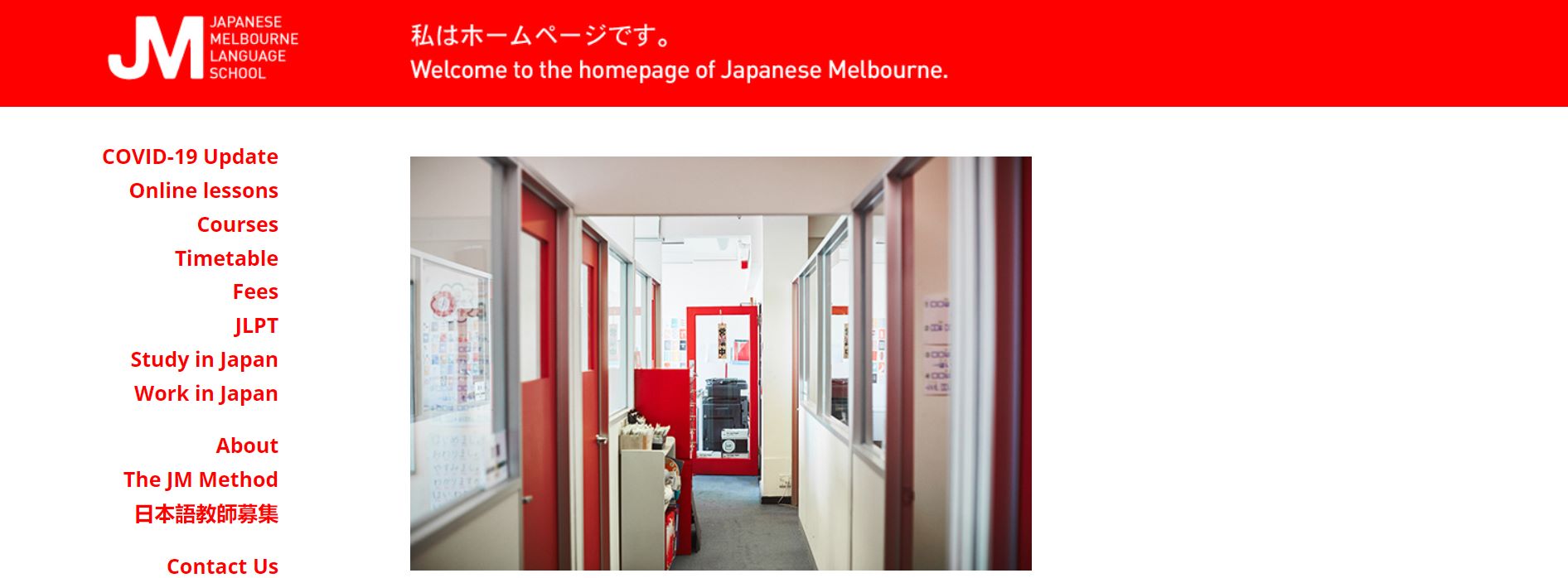
04 30 103 669
If you have previous experience learning Japanese, we encourage you to book a free online level assessment with one of our experienced staff members here.
ATO managers, television newsreaders, local artists, town council members, Apple Geniuses, families planning their first trip to Japan, software engineers, photographers, primary school teachers, art directors, Santa Claus, architects, manga-addicts, students from Saudi Arabia, and others have been among our previous students.
About Japanese Melbourne Language School
From an Ikea LACK table in a storeroom in 2007, the school has grown to occupy the top level of a CBD building with 11 classrooms.
Because most Japanese do not speak English in Japan, our student will learn to adapt and improve more quickly.
People learn Japanese for a variety of reasons, such as preparing for a personal or business trip to Japan, impressing your Japanese father-in-law, learning another language as a hobby, comprehending manga and anime, or simply understanding what an Oyako-don is.
JIC Language School
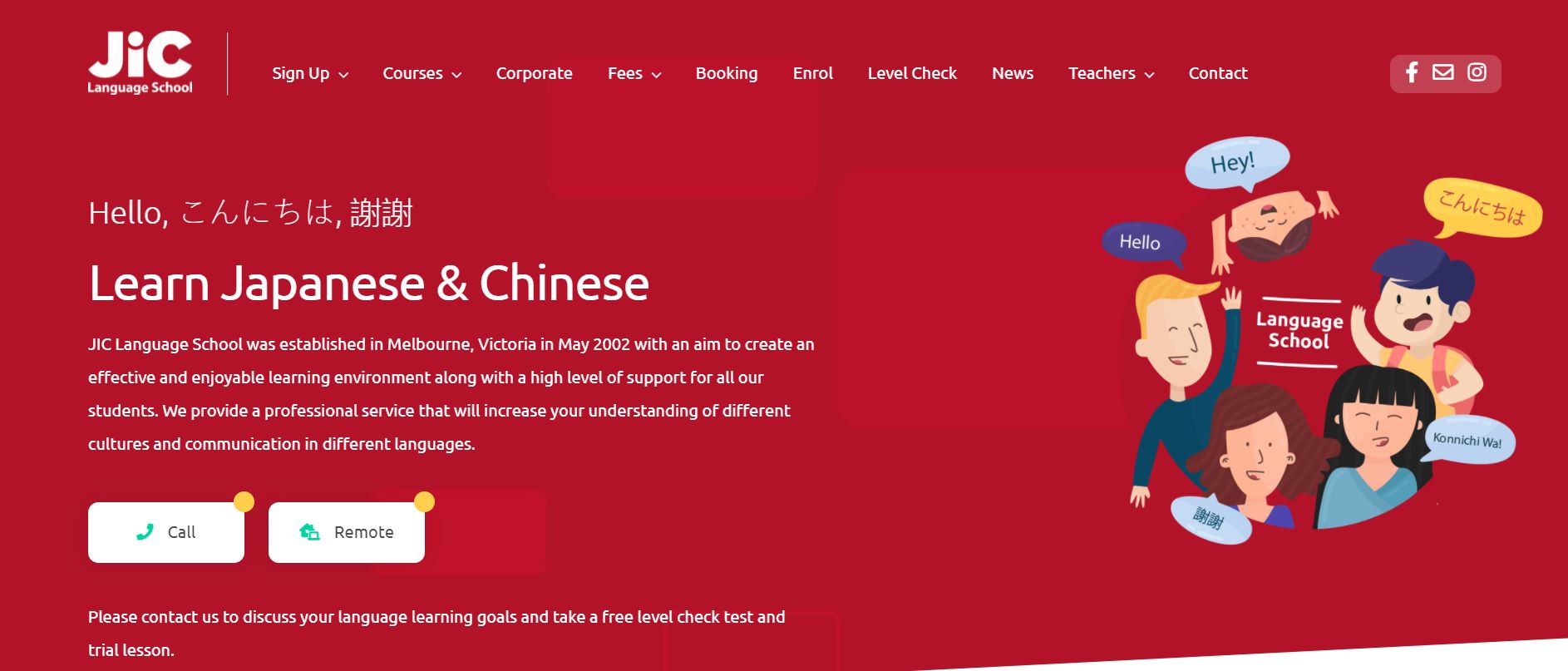
(03) 9654 5120
The JIC Language School was established in Melbourne, Victoria, in May 2002 with the intention of giving each of our students a supportive learning environment that is both efficient and enjoyable. We provide a skilled service that will enable you to communicate in various languages and understand various cultures.
Both group and private Japanese instruction is offered. The "direct method" (immersion), which completely immerses students in the Japanese language and culture, is used to teach group lessons. At JIC, all instruction is conducted in Japanese. Utilise our original textbook and other helpful tools to learn the language. Our one-of-a-kind textbook contains a plethora of practical expressions that you can immediately apply in everyday life. For general classes, courses cover all levels. VCE, JLPT, and Kids classes are also offered. This also applies to our online classes.
Our Chinese language classes are offered in both group and private settings. Beginner, Intermediate, and Advanced courses are available, as well as support classes for those interested in taking the HSK Exam. There are also off-campus lessons and courses available. Private lessons are available to students who want to study specific subjects and can be tailored to their needs. If you are unable to attend lessons in person, try our online classes.
We offer a variety of language programmes, and we make every effort to tailor lessons to individual learning needs. We guarantee that all of our instructors are qualified native speakers. Our teachers' enthusiasm and professionalism will help you throughout your language learning experience.
